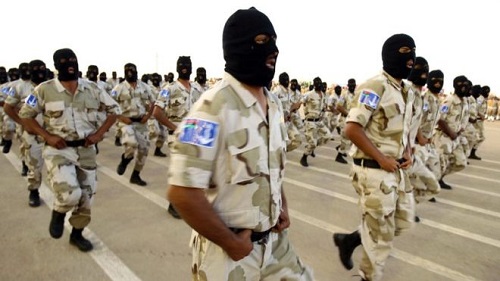At least 42 people have died in a drone strike in south-western Libya carried out by the forces of rebel Gen Khalifa Haftar, local officials say.
The strike hit a town hall meeting in the town of Murzuq, reports say.
Gen Haftar's forces - which are based in eastern Libya - say they targeted the town late on Sunday, but deny targeting civilians.
The country has been torn by conflict since the fall of long-time leader Muammar Gaddafi in 2011.
The air strike left "42 dead and more than 60 injured, 30 of them critically" at the town hall in Qalaa neighbourhood, where more than 200 people were at a meeting "to settle social differences", council official Ibrahim Omar told AFP news agency.
Local media earlier reported that the strike had hit a wedding party.
The UN-backed Government of National Accord (GNA) condemned the attack on social media and accused Gen Haftar's forces of carrying it out.
It also urged the UN to "carry out an investigation into the crimes committed by Haftar's militias in Murzuq".
Pro-Haftar media outlets said the attack had targeted Chadian mercenaries, which is how they refer to the Tebu ethnic group which opposes Gen Haftar.
Months of fighting between the GNA and Mr Haftar's forces has claimed more than 1,000 lives since April, according to the World Health Organization (WHO).
This is the second time in two months that an air strike thought to be by Gen Haftar's forces has resulted in mass civilian casualties.
In June, some 44 people were killed in a migrant detention centre on the outskirts of Tripoli.
His forces seized Murzuq earlier this year as part of an offensive to take control of the oil-producing south - but they later withdrew.
Who controls Libya?
Only Libya's myriad armed militias really hold sway - nominally backing two centres of political power in the east and west with parallel institutions.
This is under the leadership of Prime Minister Fayez Sarraj. He arrived in Tripoli in March 2016, four months after a UN-brokered deal to form a unity government, to set up his administration.
Over the last three years he has worked to gain the support of the various militias and politicians, but he has little real power over the whole country or the forces ostensibly under his control.
Tobruk administration, includes the parliament elected in 2014 after disputed elections
When those who held power in Tripoli refused to give it up in 2014, the newly elected MPs moved to the port of Tobruk, 1,000km (600 miles) away, along with the old government.
In 2015 some of these MPs backed the UN deal for a unity government, but the parliament has since refused to recognise it and has been blocking efforts to organise fresh elections because it wants Gen Haftar, who leads a powerful force called the Libyan National Army (LNA), to be guaranteed a senior role in any new set-up.
Who is Gen Khalifa Haftar?
Gen Haftar, who has been on the Libyan political scene for more than 40 years, was part of the group of officers who, led by Col Gaddafi, seized power from King Idris in 1969.
In the 1980s, Col Gaddafi put Mr Haftar in charge of the Libyan forces involved in the conflict in Chad.
But Libya was defeated by the French-backed Chadian forces, and Gen Haftar and 300 of his men were captured in 1987. Gaddafi also disowned him - prompting Gen Haftar to devote the next two decades to toppling the Libyan leader, from exile in the US state of Virginia.
After the start of the uprising against Gaddafi in 2011, Gen Haftar returned to Libya, where he became a key commander of the makeshift rebel force in the east.
With Gaddafi's downfall, Gen Haftar faded into obscurity until February 2014, when he outlined on TV his plan to save the nation and called on Libyans to rise up against the elected parliament, the General National Congress (GNC).
In May 2014, Gen Haftar launched Operation Dignity against Islamist militants in Benghazi and the east, and in March 2015, Libya's elected parliament, the House of Representatives - which had replaced the GNC - appointed him commander of the LNA.
Source : BBC





